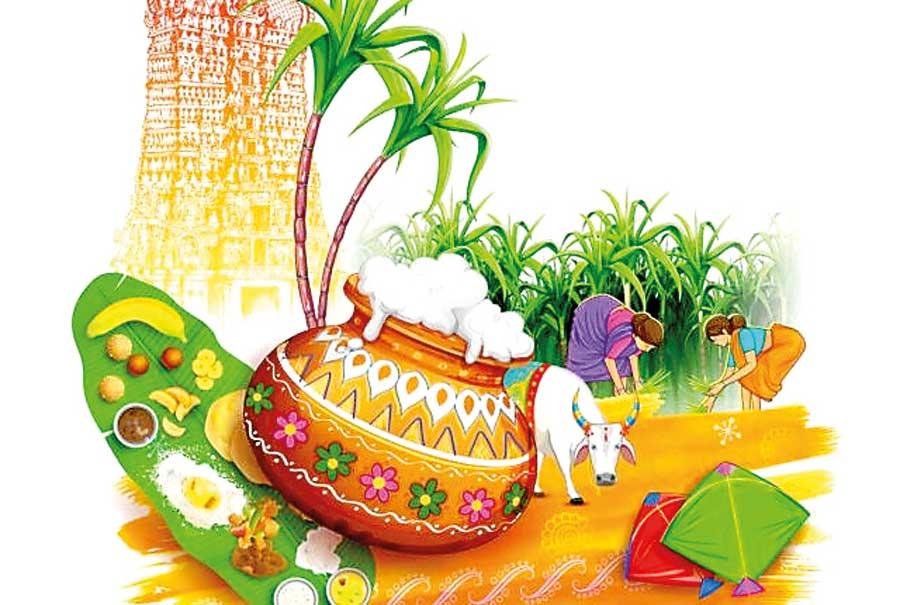Reply To:
Name - Reply Comment

- Thai Pongal is celebrated in the first month of the Tamil calendar. The festive season coincides with the period when the sun enters the zodiac sign of Capricorn (Makara). The rituals of the family commence with the boiling of a pot of rice at sunrise at the front door of the house
The Tamil festival of Thai Pongal is essentially a harvest festival supposed to have originated from the time when humans started settling down along the banks of rivers with fertile soil.  Some historians trace harvest festivals to far back as 5,000 years. Similar harvest festivals are found in almost all cultures across the world as pastoral agricultural festivals.
Some historians trace harvest festivals to far back as 5,000 years. Similar harvest festivals are found in almost all cultures across the world as pastoral agricultural festivals.
In a bid to thank the nature spirits – the sun, earth and farm animals – Tamils across the world celebrate the Thai Pongal festival on a grand scale, today (January 15, 2024), the first day of the Tamil month of “Thai”. Farmers offer the first harvest in the field to the nature spirit, the sun, in the form of cooked sweetened rice. They do not forget the farm animals who contribute in a big way to the success and prosperity of agriculture. Thus, their first ceremony of the year is the thanksgiving ceremony.
The Recipients of the Ceremony
The recipients of the above gratitude are the farm animals including cows, oxen and buffaloes. Farmers thank the sun god for energizing them to produce rice in abundance. Rice consumers are obliged to venerate the sun god and thank the farm animals for helping in the production of rice.
The Obligation of the Rice-Consuming Population
Pongal is an occasion celebrated not only by Tamils but also by almost all those who consume rice throughout the world. While farmers are obliged to venerate the sun god for energizing them to produce rice in abundance and to thank and look after the farm animals for helping them in the production of rice, the rice consumers are obliged to pay gratitude to the farmers for producing rice without allowing consumers to suffer starvation.
Boiling to Overflow
Pongal means the boiling of milk or rice till it overflows. In a sense, Thai Pongal is preparation and enjoying the first meal of the year with hopes and aspirations. In other words this is the celebration of the previous year’s achievements with bountiful reap and also celebrating the New Year in anticipation of prosperity.
The Purpose of Thai Pongal
In actual fact, the four day Thai Pongal festival is a thanksgiving festival which they hope would bring prosperity to agriculture. The sun which provides energy deserves the honour and respect of farmers. Farm animals including cows, oxen and buffaloes help the farmer. Therefore, farmers thank and look after the farm animals in the best possible manner and thank and venerate the sun god as the forerunner of a bountiful yield.
Thai Pongal – A Four Day Festival
Thai Pongal is a thanksgiving ceremony running to three or four days.
A number of parties contribute in producing an abundant crop. The sun produces energy in the process of food production, and sun light is necessary for plants to grow. Also, there should be rain to produce water which is a must in agriculture. Farm animals help in tilling and preparing the land for agriculture and the farmer is the one who makes use of the energy produced by the sun, the water produced by the rain, the land and the labour provided by the farm animals to make the harvest successful and abundant.
Bhogi Pongal
The first day of the festival which falls on the last day of the Tamil month Margarh is called Bhogi. Bhogi is dedicated to God Indra (Bhogi). He is the god of clouds and rain which makes the crops grow. Bhogi Pongal is also a day for the family. On this day, all the people clean their houses from top to bottom. Colourful garlands made of leaves and flowers are used to decorate the home exteriors. On this day, the rain god is worshipped. In India, where the majority of the people are farmers, this festival is the withdrawal of the South-west monsoon and the reaping of a joyful and a bountiful harvest.
Suriya Pongal
The second day is “Suriya Pongal” dedicated to the worship of the sun god. The members of the family wake up early in the morning on this day to create elaborate Kolam on the ground in front of their doorway. Home Kolam is created with colourful rice flour placed on the ground carefully with their hands. The festival is consecrated to the sun god as the supreme donor of life’s substance. On his benevolence depends the success or the failure of the harvest. On the morning of the Thai Pongal festive day, rice from the newly harvested paddy is macerated in fresh cow’s milk and highly seasoned with a traditional collection of condiments to promote flavour and palatability. This is cooked in front of the house on temporary hearths.
Maatu Pongal
On the day following Thai Pongal, the festival of cattle and goats – traditionally known as Maatu Pongal – is celebrated. Maatu means cattle. This is exclusively a festival of thanks giving dedicated to the silent friends in farming adored by farmers for their contribution in agricultural pursuits. On Maartu Pongal day, the domestic cattle are bathed, anointed and fed to their heart’s content. Cows and bulls are decorated with paint and bells and people pray for them. In South India, the custom is to tie small bags of money, parcels of expensive cloth and other costly presents around the horns of vigorous buffaloes, and steed and let them lose in village enclosures. Young brave men try to snatch the parcels without being attacked by the buffaloes. This is a popular game.
Kaanum Pongal/ Thiruvalluvar Day
The fourth day is termed as Kaanum Pongal. On this day, people travel to see members of other families. Younger members of the family pay homage to elders and elders acknowledge them by giving them token money. For the ritual of Kaakai Chatham, people leave food out on Banana leaves for crows (Kakkai) to eat. It is on this day that brothers and sisters meet and sisters show affection and respect to their brothers by presenting gifts and singing songs praising deities after offering light and placing kumkum on their foreheads and touching their brothers’ feet. Brothers usually respect in kind by offering gifts of clothing and other useful items their sisters would appreciate. It is also on the fourth day of Thai Pongal that poems of poets are revered. It is also called “Thiruvalluvar day”. Thiruvalluver is a famous poet. He has written thousands of couplets in the famous work “Thirukural” on moral and social standards. Thai Pongal is also an occasion for family reunion. Thai Pongal is a festival of freedom, peace, unity and compassion crystalized in the last hymn on unity in the Indian spiritual text, Rigveda. Thus, love and peace are the central themes of Thai Pongal.